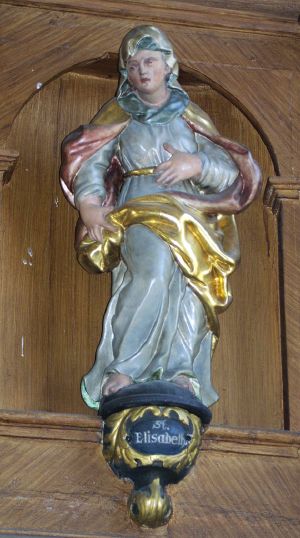Elizabeth (Biblical person)
Elizabeth, also spelled Elisabeth or Elisheva (Hebrew אֱלִישֶׁבַע / אֱלִישָׁבַע "My God is an oath", Standard Hebrew Elišévaʿ / Elišávaʿ, Tiberian Hebrew ʾĔlîšéḇaʿ / ʾĔlîšāḇaʿ)(Arabic: إشاع) was the mother of John the Baptist and the wife of Zacharias, according to the New Testament.
Relation to Mary
According to Luke 1:36 Elizabeth is related to Mary. The word used in the Greek original is suggenes which according to Strong's Greek dictionary means: a relative (by blood); by extension, a fellow countryman [1]. According to the Catholic Encyclopedia their relation is given by St. Hippolytus, according to whom they are cousins; the mother of Elizabeth, Sobe and the mother of Mary, Saint Anne are sisters [2]. The mother of Mary is also known from an other source, the infancy Gospel of James.
Some translations of this verse states their relations as relative, kinswoman or 'of your family', others such as the English Standard 2nd Revision, states that they are cousins.
In the Bible
According to the Gospel of Luke, Elizabeth was a descendant of Aaron the priest (Luke 1:5). She and her husband Zechariah were "righteous before God, living blamelessly" (1:6), but childless. Like several other providential women in the Bible, Elizabeth was barren. Luke specifically mentions that she was old old, being "far advanced in years." Zechariah, having been chosen by lot for the honor to minister at the altar of incense in the Temple of Jerusalem was visited by the Angel Gabriel, who told him that Elizabethwould have a son who "will be great in the sight of the Lord" (1:15). Zechariah expressed doubts that such a things could be possible, because "I am an old man and my wife is well along in years." Gabriel caused him to lose the power of speech because of his doubt.
Nevertheless, after Zechariah returned to their home in the hill country of Judea, both he and Elizabeth proved equal to the task. Overjoyed, Elizabeth declared, "The Lord has done this for me. In these days he has shown his favor and taken away my disgrace among the people." She secluded herself for five months to ensure the success of her pregnancy. In the sixth month, her period of seclusion came to an end as she received an unexpected visit from of her young cousin Mary(1:36). Elizabeth's fetus become agitated, and she prophecied:
- "Blessed are you among women and blessed is the fruit of your womb. But why am I so favored, that the mother of my Lord should come to me?" (1:41-43)
Elizabeth and Zechariah provided hospitality to Mary for three months, but as the time for Elizabeth to give birth neared, Mary returned to Nazareth.
Elizabeth gave birth to a son and, when the extended family gathered for his circumcision eight days later, named him John. The relatives, not including Mary, protested on the grounds that not of the child's ancestors had been so-named. At this point Zechariah confirmed the name through the use of a writing tablet, and his power of speech miraculously returned. He too then prophecied, predicting:
- You, my child, will be called a prophet of the Most High;
- for you will go on before the Lord to prepare the way for him,
- to give his people the knowledge of salvation
- through the forgiveness of their sins. (Luke 1:76-77)
John would indeed go on to be a famous prophet in Christian tradition, being the forerunner of Jesus who baptized many thousands at the River Jordan and testified to Jesus as the son of God. Outside of the New Testament, John is mentioned in the works of the historian Josephus. Luke reports John's reputation to be so great that: "The people were waiting expectantly and were all wondering in their hearts if John might possibly be the Christ. (3:15)
Elizabeth is not mentioned in the New Testament outside of the Gospel of Luke. Some modern sceptical scholars argue that she is a fictional character and that Luke invented the notion that Jesus and John the Baptist were related. However, their critics have pointed out such a claim is impossible to prove and that it would be ludicrous to dismiss a character like Elizabeth solely on the basis that she is mentioned in only one of the four Biblical gospels. There are several female characters who are mentioned in only one of the gospels - including Mary, the wife of Cleopas, Saint Joanna and the female apostle, Susanna. Some theologians have suggested that Elizabeth is included in Luke's nativity account because his version of events deliberately focuses more upon the personal experience of the Virgin Mary during her pregnancy than Matthew's account (the two other gospels, Mark and John, do not include an account of Jesus's birth and instead start their narratives at the beginning of his ministry.) Elizabeth is also mentioned in several books of the Apocrypha, most prominently in the Protevangelion of James, in which the birth of her son and the subsequent murder of her husband are chronicled.
Sainthood
Elizabeth is revered as a saint in the Catholic, Orthodox and Anglican traditions.
Credits
New World Encyclopedia writers and editors rewrote and completed the Wikipedia article in accordance with New World Encyclopedia standards. This article abides by terms of the Creative Commons CC-by-sa 3.0 License (CC-by-sa), which may be used and disseminated with proper attribution. Credit is due under the terms of this license that can reference both the New World Encyclopedia contributors and the selfless volunteer contributors of the Wikimedia Foundation. To cite this article click here for a list of acceptable citing formats.The history of earlier contributions by wikipedians is accessible to researchers here:
The history of this article since it was imported to New World Encyclopedia:
Note: Some restrictions may apply to use of individual images which are separately licensed.
